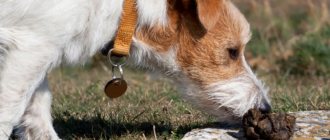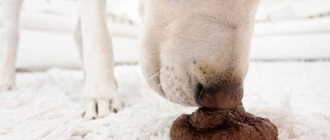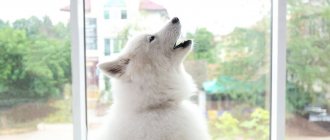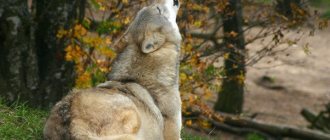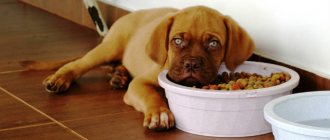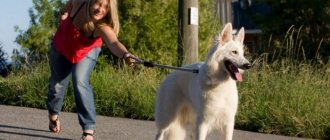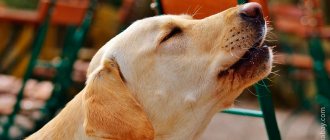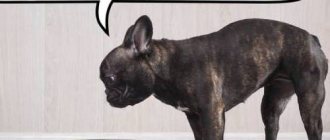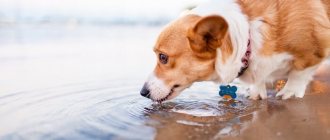The situation when a dog exhibits coprophagia is not uncommon, and makes owners in horror look for a way out of the situation. Statistics show that about 80% of domestic dogs are susceptible to this habit.
Coprophagia itself is not a disease, but it causes a lot of inconvenience to the owner and significantly increases the risk of contracting dangerous infections.
It is important to understand what provokes the animal to these actions and only then try to correct the animal’s behavior.
Why does a dog eat feces: reasons
Why do dogs eat poop and how to stop your dog from eating poop?
Poop eating, or scientifically known as coprophagia , is a normal behavior for many animals and occurs in approximately 25% of dogs . There are many reasons why a dog might eat poop, but the main reason is that he simply likes the taste and contents.
We may be put off by the thought of poop, but for dogs, poop is full of interesting information that tells them who its creator was and what he ate.
Other reasons why a dog eats poop:
- The animal obtains micronutrients from undigested matter;
- The dog learned this behavior from its mother as a puppy;
- The animal is hungry and looking for something to eat;
- The dog is bored or stressed;
- The animal is sick.
Dogs love to eat poop to get nutrients
One possible reason why a dog eats poop is because it enjoys it. A dog's sense of smell and taste is very different from ours, and they can detect undigested fats, proteins, or other substances that smell good to them.
Dogs often prefer harder, fresher poop, especially if the poop is less than two days old. Humans often explore things with their hands, but dogs use their mouths to help them understand the world, whether that's by licking our face when the animal greets us, carrying things between our teeth, or playing with toys or balls.
For a dog, eating poop may just be another way for him to explore something he finds interesting. And yes, we don’t understand this.
They copy their mother
Good mothers instinctively lick their newborn puppies to help them go to the toilet and keep them clean. They also eat the feces of their puppies to keep the area clean and protect the babies from disease and parasites.
In the wild, this instinct also helps prevent attacks from predators who might smell a dog's den. Mom teaches them how to be a dog, so puppies instinctively copy their mother's behavior.
Most mothers stop cleaning up after their puppies when they transition to solid food or leave their den to live on their own. Around this time, most puppies stop being interested in poop, but some seem to remain puppies forever.
Hunger is one of the reasons why dogs eat feces.
You can read studies that have shown that dogs that are described as “gluttons” tend to be more likely to eat poop.
It could be that the dog is just very food-obsessed, but if your dog regularly eats poop, it might be a good idea to consider:
- Perhaps she tends to eat poop when she is most hungry, perhaps she is not getting enough food?
- Do you have a regular feeding schedule and do you stick to it?
- Are you feeding your animal high-quality, high-calorie food that will allow him to feel full?
The effect of boredom, stress or anxiety
Eating feces can sometimes be a reaction to stress, boredom or anxiety. If your dog is alone at home for a long time, he may start eating poop out of boredom.
In these situations, the dog needs to be given more mental and physical stimulation, and you should consider how to organize a walk for the dog to provide him with company during the day while you are not at home. It might be worth asking a neighbor to walk the dog or someone else, perhaps even for a little money.
If a dog is stressed, then it can eat it, eating feces out of grief and thus calming down.
If your dog starts eating its own feces, never punish it. Punishing an already anxious dog can further increase stress levels and make the situation worse.
How to stop a dog from eating excrement (poop) outside? Causes associated with dog diseases
Possible medical causes
A common belief is that eating feces is a sign of a vitamin and calorie deficiency, but since many dogs eat feces, it is unlikely that the cause is a nutritional deficiency.
There are some medical conditions that may cause your dog to eat feces.
Here are some of them:
- Taking steroids increases interest in feces;
- Diseases that are characterized by increased appetite, such as diabetes, thyroid problems, taking anti-epileptic drugs or worms;
- Digestion problems;
- Dementia or other brain diseases;
- Diseases that change the smell or contents of their feces, making them more attractive.
You should visit your veterinarian if your dog suddenly starts eating feces, especially if he has recently developed any other symptoms of illness.
Educational moment
Do you punish your dog if he goes to the toilet in the wrong place? There is a possibility that, due to fear of punishment, the pet will try to hide the “traces of the crime” by eating its poop. Coprophagia can develop in a puppy for this very reason.
Sometimes dogs try to “eat stress” in this way. The fear of being left alone can lead to some negative aspects in the animal’s behavior - uncleanliness, increased vocalization, and coprophagia are among them.
Pay more attention to your pet. If you get a dog, be prepared to spend more time with it - walking, training, playing. During your walk, keep your pet busy with games, exercise, and pay more attention to training. Use toys to keep your dog's mouth busy. If the animal does not have time and reason to sniff objects lying on the ground, its attention will not be attracted to piles of excrement left behind.
You can use a muzzle while walking - such that it does not interfere with normal breathing, but does not allow you to pick up something from the ground. A leash will also help distract your pet from unnecessary objects. If the dog is interested in a pile lying on the ground, pull the leash and command: “Ugh!” If you repeat such exercises, the dog will learn the lesson and will cease to be interested not only in feces, but also in other objects lying on the ground.
Important!
Don't lose patience during the parenting process. Consistency and persistence will help achieve immediate and unquestioning obedience. And don’t forget to reward your pet when it achieves positive training results.
What proportion of dogs are affected by the problem?
The study found that of more than 1,500 dogs, 23% of dog owners had seen their pet eat feces at least once in their lives, with 16% of animals described as “frequent fecal eaters.”
These dogs are most likely to be:
- Greedy for food, “gluttons”;
- Live with other dogs;
- Terrier or hound (the most common were Scottish Shepherds, also known as collies, and most rarely, poodles)
It is important to know! No associations could be found between fecal intake and the dog's age and diet.
Boredom and lack of attention
A dog eating poop is a great way to get the owner's attention. When there is a lack of attention, the dog tries to direct the owner’s gaze to himself. For this purpose, any techniques are used. If the owner swears at the dog, the animal understands that the owner is paying attention to him and will try to do everything possible to get the owner's attention, including eating his own feces.
The animal does not think about subsequent punishment at this moment, the main goal is the attention of the owner, and the punishment that follows in the future is direct proof for the dog of belonging to the pack.
Is it dangerous for a dog to eat feces?
Eating feces is normal behavior for dogs. In most cases, this is absolutely safe for the animal, but there are exceptions.
Even if the dog likes the net of feces, then in any case it should be stopped, since there is always a risk of becoming infected with parasites (worms and helminths), viruses and bacteria. Additionally, some feces may contain medications from other animals that will be toxic to your dog. For example, anti-worm medications contained in horse manure.
If you can't stop your dog from eating feces, you should give him something to eat or drink to rinse his mouth.
Don't let the animal lick you. Wash your hands thoroughly if they come into contact with your dog's mouth or saliva.
Possible consequences
Eating feces by your animal, as a rule, does not have too serious consequences. But the most common unpleasant consequences of such an activity are:
- Infection with worms. Agree, there is nothing pleasant about this. And how much effort it takes to remove parasites from the body of a shaggy pet.
- Poisoning . The excrement of various animals can sometimes contain substances that are harmful to the dog's body. They lead to poisoning, sometimes very severe. And in some cases, this can even end disastrously for the pet and its owner.
- Toxoplasma . These substances are found in cat feces and are very dangerous to your dog's health. After all, they affect all organs, and especially the nervous system.
- Viral diseases . Hepatitis and parvovirus infections are also often found in the excrement of various animals.
Answers to frequently asked questions on this topic
Can my dog get worms and parasites from eating feces?
The answer is YES. Some parasites or their eggs can be found in animal droppings and can be passed on to your dog by eating them. Dogs can become infected with hookworm, roundworms, and whipworms.
How to stop a dog from eating from the cat litter?
Many dogs enjoy eating cat poop, so for some dogs, a cat litter tray is like a buffet that's hard to resist.
We have a separate article that we recommend reading: How to stop a dog from eating cat poop.
How to clean my dog's mouth?
The worst thing is to see your dog eating poop, it means that later he will try to lick you or he will have disgusting smelling breath, how do you clean his mouth after that?
Here are some simple tips:
- Give food and water to drink as this will help freshen the mouth;
- Wipe your mouth with a damp cloth;
- Brush the teeth and mouth with a toothbrush, but do not use human toothpaste, as toothpaste may be harmful to your pet.
Why does my dog eat poop in winter?
Dogs rarely eat soft poop or diarrhea, often preferring to eat harder stool. The harder it is, the better it seems. Some dogs especially like to eat frozen poop, apparently they like the crunchiness of it. The problem is that in winter, on snow, poop is more noticeable compared to white snow.
What are the dangers of eating excrement?
Feces are waste products of the body, consisting of undigested food debris, microorganisms, waste, toxins and other metabolic products. Often, feces contain protozoan cysts, parasitic worms, helminth eggs, pathogenic microorganisms and viruses, which, if ingested, can cause dangerous diseases .
Helminthiasis
The most common disease caused by damage to the body by parasitic worms. Helminths in most cases attach to the intestinal wall, but can also affect the liver, bile ducts, muscles, and brain. By parasitizing the dog’s body, worms cause serious damage to his health, which subsequently leads to:
- high susceptibility to bacterial and viral infections
- development of anemia
- allergic reactions
- digestive disorders
- intestinal obstruction, which in turn can lead to death
Parvovirus enteritis
A very dangerous disease characterized by rapid progression and high mortality . When infected with parvovirus, hemorrhagic inflammation of the small intestine and destruction of blood cells-lymphocytes occurs, which is manifested by symptoms in the form of severe weakness, weight loss, dehydration, vomiting, and diarrhea mixed with blood.
Weyl-Vasiliev fever (Leptospirosis)
An acute infectious disease characterized by damage to the nervous system, kidneys, liver, heart and blood vessels. Weyl-Vasiliev fever is manifested by severe intoxication, intense muscle pain, jaundice, convulsions, and low blood pressure.
Toxoplasmosis
A protozoal infection with a variety of course and clinical manifestations. Toxoplasmosis can occur in acute, chronic and latent forms, which greatly complicates diagnosis. Toxoplasmosis can affect almost all body systems: muscular, nervous, respiratory, digestive, cardiovascular.
